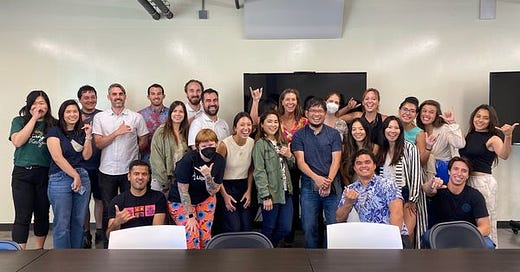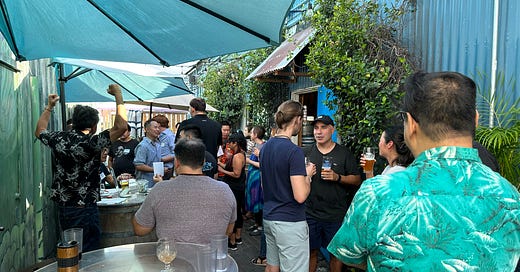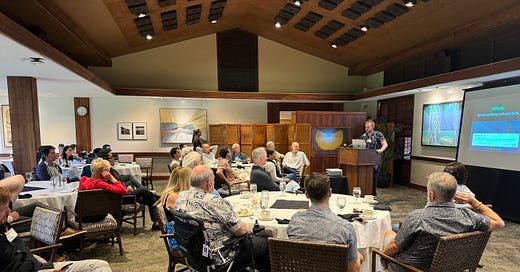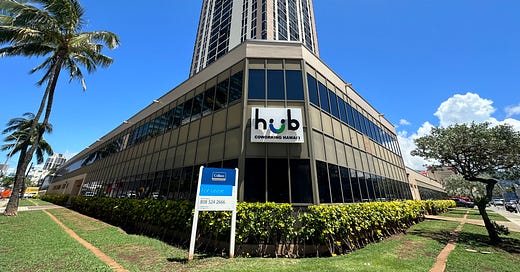
Female founders are foremost in fourteenth Blue Startups family
We've hit 75 percent of our fundraising goal for the Jennifer Ozawa Memorial Scholarship! Thank you so much for your generosity, helping my family ensure my late wife's legacy is empowering others to achieve their higher education goals.
"The future is female" is a rallying cry that seems more relevant today than it did at its inception in the 1970s, or in its revival in the 2016 U.S. presidential campaign.
Existential battles over rights and respect, never completely settled, are seeing a resurgence. Fortunately, the unstoppable movement continues to press forward across communities and sectors... including the blue-sky, change-the-world startup scene.
The statistics bear out the female-forward strategy: Startups with women on the team are less likely to fail. Female led businesses generate higher revenues. Women have been found to attract more crowdfunding than men. Female leadership can be a competitive advantage.
Last year, companies founded solely by women raised nearly $6.4 billion—83% higher than the total raised in 2020. The bad news? That amounted to only two percent of the total venture capital funding pie... the lowest percentage since 2016.
The gender gap, compared to the likely benefits, means opportunity. And one that Hawaii's largest and longest-running technology accelerator is seizing upon.
Eight of the six companies in its upcoming 14th cohort, to be introduced in person on Tuesday, are led by women.
"This is the first time where we've really hit the ball out of the park with regards to attracting female founders — and not just companies that have one, but companies that have two or three female female founders in the mix," says Blue Startups Managing Partner Chenoa Farnsworth. "That's pretty exciting."
More money for more programs
After racking up tens of thousands of steps in the Hawaii state Capitol in the spring, members of Hawaii's innovation ecosystem were gratified to see that the state's replenished coffers led to rejuvenated funding for a variety of programs seen as vital to growing and diversifying Hawaii's economy.
From supporting Hawaii manufacturers to matching federal grant funds to sustaining the state's startup ecosystem, more money will be going to more places and partners aligned behind a vision of a successful and sustainable Aloha State.
"We're definitely in a better position now than we were for the last several years," says Chenoa Farnsworth, managing director of Blue Startups. "Over the years they've had to scrape together whatever pennies they could, and now they're back to like being pretty much fully funded, which is great."
Blue Startups is a public-private partnership founded by Tetris Company executives Henk and Maya Rogers and Farnsworth. It is funded by Tetris, private investors, and the state of Hawaii and the Hawaii Technology Development Corporation.
Farnsworth has watched Hawaii's tech scene grow since Blue Startups was founded a decade ago.
"I actually did a count the other day," she said. "By my count, there are now ten accelerators in Hawaii, possibly more."
Farnsworth acknowledges that a bigger overall budget — state funding supplemented with COVID recovery and stimulus funds at the county level — might still mean less funding for some.
"There's a lot more players now, and the pot will be split many more ways," she said. "But all together, we should have a good chunk of change to put into economic development organizations here."
Blue Startups will have to make its case, like every other accelerator and organization. But its 14th cohort represents significant experience and a strong track record in the space.
Women empowering women
As they do every round, Blue Startups received several hundred applications for Cohort 14. And attracting female-led startups is not a foregone conclusion. Fortunately, Farnsworth and co-founder Maya Rogers have focused specifically on that goal.
"I think our reputation for being a female founder friendly program is kind of getting out there, and now we have a cadre of alumni that are really strong female led companies that can also give testimony to say that Maya and I are leading from the top and walking the walk as well," Farnsworth said.
"I think it resonates as authentic and that really helps us recruit, and also helps us actually get people to sign on the dotted line," she added.
And while there are other incubator and accelerator programs dedicated entirely to women — like FoundHer, which is kicking off its second cohort in September — Farnsworth notes that Blue Startups is looking for a particular profile.
"I think the defining characteristic, to contrast with other programs, is that we're still looking at high growth companies," she says. "These are companies with global ambitions, these are all very ambitious women who want to take over the world."
Beyond the gender mix, the latest Blue Startups cohort again brings together a mix of local, national, and international companies.
"We have one company from Taiwan, that's our east-west play, if you will, and one company from Italy," Farnsworth says. "We've also got three companies that are local that are in the the full program, and then two more that are observing the program, so we have five local companies participating."
The last company is from the mainland.
Making grandmas and yoga scalable
Blue Startups is known as a technology accelerator focused on bridging Asia and North America, with a taste for "capital efficient and scalable technology companies" in the B2B, sustainability, and travel and tourism space.
But two of the members of Cohort 14 stood out to me as outliers: Before Noon and Nonna Live.
Before Noon offers online group mindfulness sessions (reiki, yoga, dance, and "tarot meditations") and wellness products like oils, incense, and crystals. Nonna Live provides homemade pasta classes taught by Italian grandmothers live from kitchens in Italy.
What did Blue Startups see in these companies?
"Both of those teams have been very clear with us about their ambition to be a high growth company," Farnsworth explained, and noted common biases might prompt typical investors to pass them over.
"The Before Noon founders are very sharp and very well connected in the corporate world, and they've already done some work with corporations like Ralph Lauren," she said. "They've also done corporate events, and pitched their service as an employee benefit."
Farnsworth pointed to virtual therapy service BetterHelp as a model, with Before Noon focused on alternative therapies and practices.
"Their pathway forward is going to include a lot of B2B business development, and since everything that they're doing is virtual, wit nothing in person, it is very scalable in that sense."
And how do you scale Italian grandmas?
"Their ambition is to work with grandmas all over the world to do similar things," Farnsworth notes. "Right now they have Nonna, and Italy, but if you can imagine, they want to kind of cut and paste this business model and replicate it in other geographies."
Obachan Live from Japan! Halmeoni Live from Korea!
"Tutu Live from Hawaii," she said. "Exactly."
"There's something very special about our connections with grandmas and food, it makes people feel really good," Farnsworth says. "They've definitely proven that with their product right now, they do very well with Nonna Live, but they are very ambitious, and they want to replicate this, so we're going to help them build that that replicable model."
A new space
One thing that's new with Cohort 14 is where the Blue Startups program will be housed. Instead of being co-located with Tetris in a downtown Honolulu high rise, cohort members will meet, work, and participate in workshops and mentorship sessions at the Entrepreneur's Sandbox in Kakaako.
"Our cohorts tend tended to be pretty isolated, we just put them in the office and then they never see the light of day for 12 weeks," she recalled. "The Sandbox is a place that people come through and have other meetings, and you can go, 'Hey, you should meet that guy,' and there are going to be those kind of bump-into-people moments."
"Being a little more exposed to the community will actually be helpful," she added. "I think this will actually be healthier for everybody."
Farnsworth said she was initially hesitant, and the move was painful.
"But the more I started thinking about it, the more I thought there could be more benefit than detriment and, and now that we're there, I can definitely see that," she said. "I realized this is actually probably good for us."
The schedule for Cohort 14 is also different.
"We're experimenting with this cohort — we're calling it hybrid, because we're only doing six weeks in person and then six weeks virtual," Farnsworth says. "Last cohort was actually all in person, it was 12 weeks in person, and that's so expensive for a company that doesn't live here to come here for that long."
On the other hand, founders won't be able to stay at home the entire time, either.
"We're not allowing that, you have to be here," she says. "So many programs are running virtual, and it's harder to compete with that, because it's so much less disruptive, but we really haven't run an all-virtual cohort since 2020."
Not only was the virtual approach less enjoyable, it was also less productive.
"I don't think we got nearly the same outcomes as we do when we run it in person, so I think you have to have the in person component," she said. "We're trying to experiment with how much of that do you need — how much creates bonding relationships that will that will last?"
Farnsworth admitted that with the cohort kicking off this week, she's already questioning whether six weeks will be enough.
"I can tell you already, it feels like... holy shit, this can go by so fast," she laughed. "Maybe it should eight weeks? Again, it's an experiment."
Cohort 14 Companies
Here are the startups in the latest Blue Startups cohort:
A-Forms: A-Forms provides a digital health coach and educator and aims to empower three billion patients per year to improve their health. https://www.a-forms.org
Before Noon: Before Noon is the go-to place for holistic therapy. We offer virtual live group holistic therapy sessions such as Reiki, Restorative Yoga, Ecstatic Dance, and Tarot Meditation. https://www.beforenoon.co/
Bonda: Bonda’s mission is to elevate workplace happiness by helping organizations foster belonging and connection at work. https://www.bonda.ai/
Hohonu: Growth Stage Company. Science-driven water monitoring to improve climate change adaptation. https://www.hohonu.io/
LiquiDonate: LiquiDonate is a sustainable social impact solution for retailers, businesses, nonprofits and community organizations. https://liquidonate.com/
Mappy: Mappy is a geospatial platform connecting venue operators with their guests. Mappy developer tools for mobile apps are designed to enhance the guest experience by providing the ability to find friends, family, and amenities on custom, interactive 2D/3D maps. https://www.bemappy.io/
Nonna Live: A homemade pasta class experience taught by Italian grandmothers live from Italy to your kitchen. https://nonnalive.com/
Quibble: Quibble helps property managers optimize their revenue with better pricing and analytics. https://quibblerm.com/
Sensay: Sensay is an AI-powered platform that enables teachers to create online speaking exercises for students. In partnership with teachers, Sensay unlocks opportunities to speak English frequently and gives instant, motivating AI-powered feedback on fluency, pronunciation, and more. https://www.oksensay.com/
Want to meet the founders and learn about their stories and companies in person? Blue Startups is hosting a meetup for Cohort 14 on Tuesday, July 26 at the Entrepreneurs Sandbox. Register here!


















